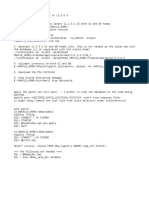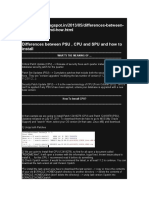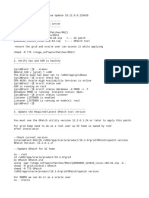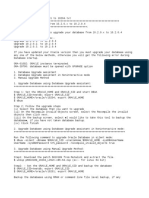0% found this document useful (0 votes)
29 views2 pagesPatching
The document outlines the steps for patching an Oracle database, including downloading the patch, checking and upgrading the OPatch utility, taking backups, and applying the PSU patch. It details commands for checking prerequisites, applying the patch, and executing post-installation scripts. Finally, it includes instructions for verifying the patch application and starting the database.
Uploaded by
Poreddy SandeepreddyCopyright
© © All Rights Reserved
We take content rights seriously. If you suspect this is your content, claim it here.
Available Formats
Download as TXT, PDF, TXT or read online on Scribd
0% found this document useful (0 votes)
29 views2 pagesPatching
The document outlines the steps for patching an Oracle database, including downloading the patch, checking and upgrading the OPatch utility, taking backups, and applying the PSU patch. It details commands for checking prerequisites, applying the patch, and executing post-installation scripts. Finally, it includes instructions for verifying the patch application and starting the database.
Uploaded by
Poreddy SandeepreddyCopyright
© © All Rights Reserved
We take content rights seriously. If you suspect this is your content, claim it here.
Available Formats
Download as TXT, PDF, TXT or read online on Scribd
/ 2
























































